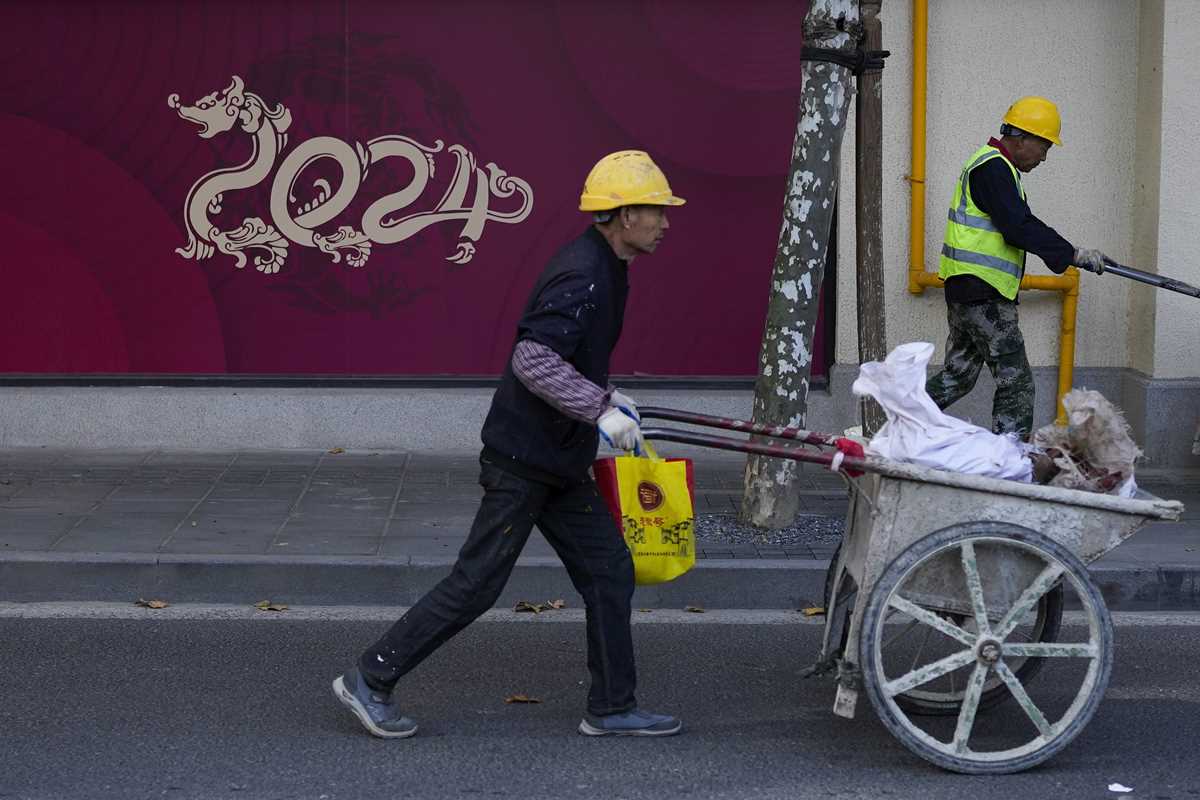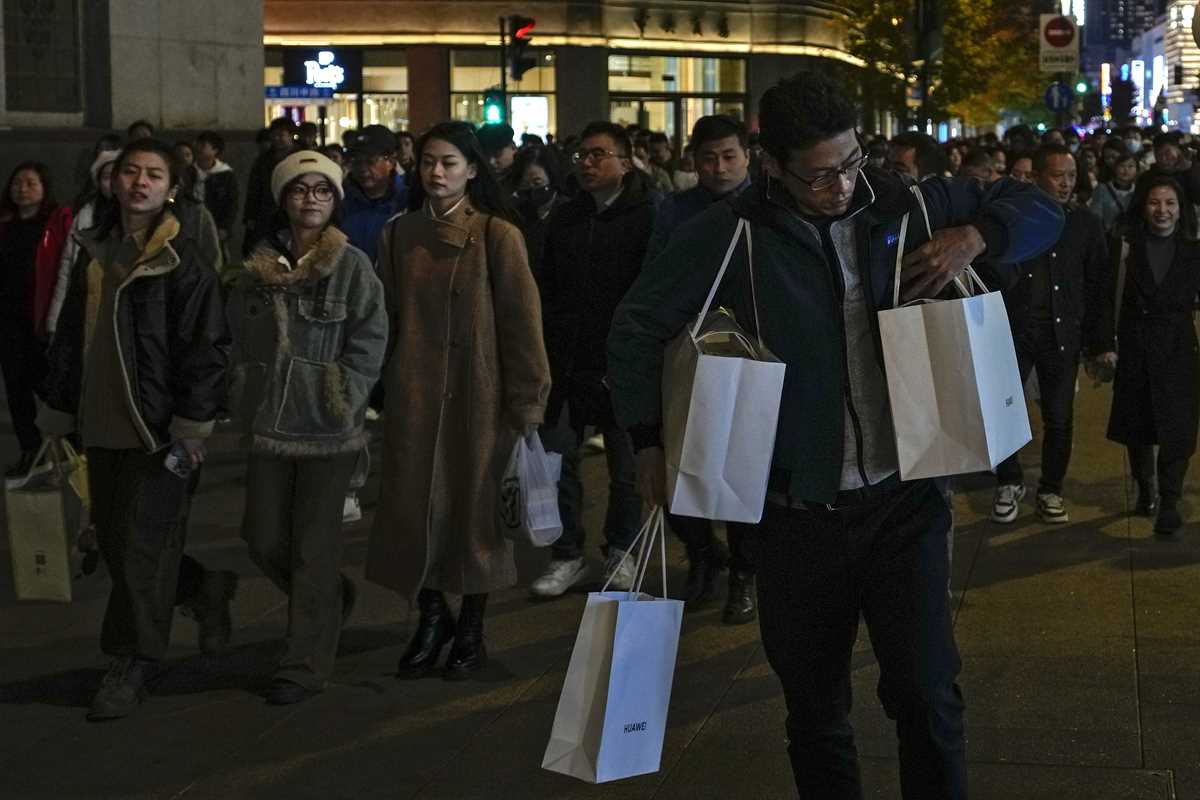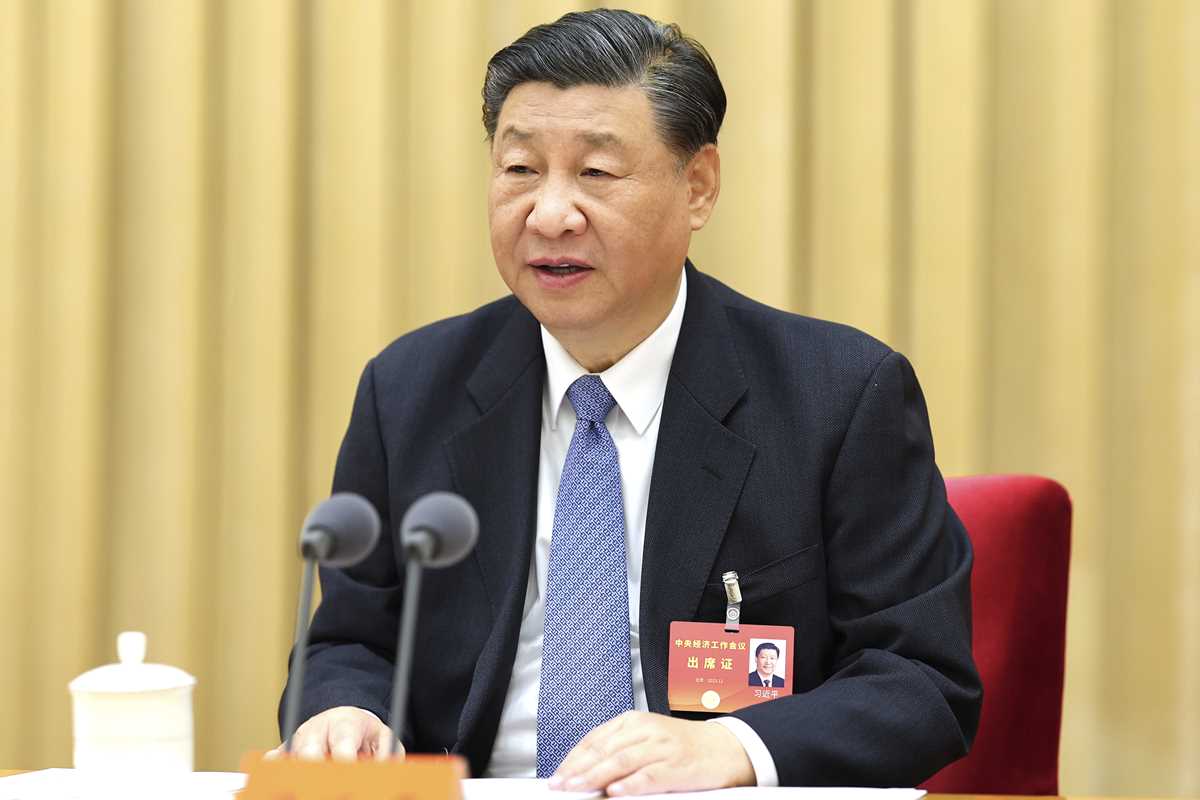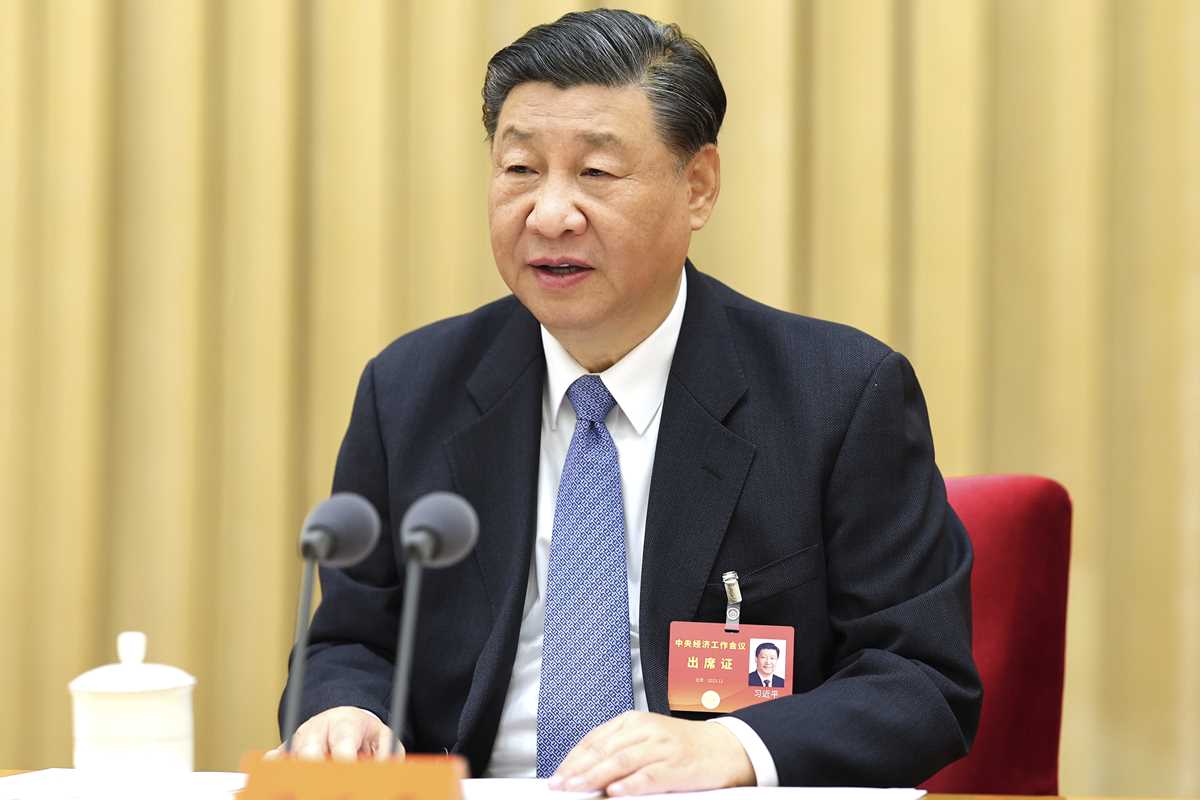 Workers push trolleys passing by under construction retail shop baring a dragon shaped 2024, the Year of the Dragon on the Chinese calendar, in Shanghai, China on Nov. 25, 2023. Chinese leaders have wrapped up a two-day annual meeting to set economic priorities for the coming year, the official Xinhua News Agency reported Tuesday, Dec. 12, 2023 without giving details of what was decided. (AP Photo/Andy Wong)
Workers push trolleys passing by under construction retail shop baring a dragon shaped 2024, the Year of the Dragon on the Chinese calendar, in Shanghai, China on Nov. 25, 2023. Chinese leaders have wrapped up a two-day annual meeting to set economic priorities for the coming year, the official Xinhua News Agency reported Tuesday, Dec. 12, 2023 without giving details of what was decided. (AP Photo/Andy Wong) A man adjusts his bag of purchased goods as visitors tour at a Nanjing pedestrian shopping street in Shanghai, China on Nov. 25, 2023. Chinese leaders have wrapped up a two-day annual meeting to set economic priorities for the coming year, the official Xinhua News Agency reported Tuesday, Dec. 12, 2023 without giving details of what was decided. (AP Photo/Andy Wong)
A man adjusts his bag of purchased goods as visitors tour at a Nanjing pedestrian shopping street in Shanghai, China on Nov. 25, 2023. Chinese leaders have wrapped up a two-day annual meeting to set economic priorities for the coming year, the official Xinhua News Agency reported Tuesday, Dec. 12, 2023 without giving details of what was decided. (AP Photo/Andy Wong) In this photo released on Dec. 12, 2023 by Xinhua News Agency, Chinese President Xi Jinping leads delivers a speech at the annual Central Economic Work Conference in Beijing. Chinese leaders have wrapped up the two-day annual meeting to set economic priorities for the coming year, the official Xinhua News Agency said in a report Tuesday that cited a litany of problems but also said the world's second-largest economy had "achieved a recovery." (Yao Dawei/Xinhua via AP)
In this photo released on Dec. 12, 2023 by Xinhua News Agency, Chinese President Xi Jinping leads delivers a speech at the annual Central Economic Work Conference in Beijing. Chinese leaders have wrapped up the two-day annual meeting to set economic priorities for the coming year, the official Xinhua News Agency said in a report Tuesday that cited a litany of problems but also said the world's second-largest economy had "achieved a recovery." (Yao Dawei/Xinhua via AP) In this photo released on Dec. 12, 2023 by Xinhua News Agency, Chinese President Xi Jinping leads delivers a speech at the annual Central Economic Work Conference in Beijing. Chinese leaders have wrapped up the two-day annual meeting to set economic priorities for the coming year, the official Xinhua News Agency said in a report Tuesday that cited a litany of problems but also said the world's second-largest economy had "achieved a recovery." (Yao Dawei/Xinhua via AP)
In this photo released on Dec. 12, 2023 by Xinhua News Agency, Chinese President Xi Jinping leads delivers a speech at the annual Central Economic Work Conference in Beijing. Chinese leaders have wrapped up the two-day annual meeting to set economic priorities for the coming year, the official Xinhua News Agency said in a report Tuesday that cited a litany of problems but also said the world's second-largest economy had "achieved a recovery." (Yao Dawei/Xinhua via AP)BANGKOK (AP) — Chinese leaders have wrapped up a two-day annual meeting to set economic priorities for the coming year, the official Xinhua News Agency said in a report Tuesday that cited a litany of problems but also said the world's second-largest economy had “achieved a recovery.”
The report gave no details of specific policy changes, but laid out broad goals that are in line with what the ruling Communist Party has been doing as it endeavors to steer the world’s second-largest economy toward more sustainable, stable growth as China recovers from the setbacks of the COVID-19 pandemic.
The property industry is in crisis. Prices have been falling for months, suggesting weak overall demand both inside China and in global markets. Youth unemployment is precariously high and local government debts are adding to pressures on the financial system.
The Xinhua report said that China was contending with slack demand, excess industrial capacity, weak consumer confidence and “certain risks and hidden problems" — and a world that has grown increasingly "complex, severe and uncertain."
“China still has to overcome some difficulties and challenges to further revive the economy,” it said. “It is important to be more mindful of potential dangers and to effectively respond to and solve these problems.”
But it also called for greater confidence, saying that “favorable conditions outweigh unfavorable factors.”
The annual economic work conference is usually held in mid-December. It followed a meeting of top party leaders last week where Xinhua reported that Xi had described 2024 as a “crucial year” for attaining goals laid out in the party’s five-year plan through 2025.
Reports on both meetings suggest officials are seeking greater consistency in carrying out policies. That hints at concerns over moves in recent years that have at times caused major disruptions, such as strict and disruptive anti-COVID 19 policies that Beijing abruptly abandoned late last year.
Tuesday's report said the meeting had called for maintaining stability and for establishing “the new before abolishing the old,” a phrase analysts said suggested greater caution and a more gradual approach.
Policy swings such as the decision late last year to abruptly drop the anti-virus controls, and uncertainty over regulatory changes have also unnerved foreign companies operating in China and appear to be deterring foreign investment, which has fallen sharply in recent months.
The economy has been slowing from its past double-digit growth for years and is forecast to have expanded at about a 5% annual pace this year, in line with the government's target. Most estimates suggest it will slow further next year.
Last week, Moody’s Investor Service downgraded China’s sovereign debt rating as the country’s real estate crisis seeps into local governments and private financing. It also downgraded ratings for some major Chinese banks and insurance companies.
China has tipped into deflation in recent months, another sign of weakness.
Wholesale, or producer prices, have fallen year-on-year for all of 2023, dipping to a low of minus 5.4% in June. Consumer price inflation has hovered near 0% or below in annual terms since April.
The property sector, a major source of demand for any major economy, has stalled with dozens of developers defaulting on their debts and struggling to finish apartments they promised to deliver.
In response, the government has eased borrowing rules and cut mortgage rates for first-time homebuyers while providing some tax relief measures for small businesses. Late last month, it announced plans to issue 1 trillion yuan ($330 billion) in bonds for infrastructure projects and disaster prevention, dipping deeper into deficit to try to nudge the economy into higher gear.
The weak housing market is among trends that have sapped enthusiasm for spending, hindering progress toward increasing domestic demand to help drive growth. Another is the high rate of unemployment among young Chinese, which was at about 20% as of June. That is the latest figure available after the government suspended its monthly reporting on that measure.
The Xinhua report said that leaders had resolved to do everything possible to “secure people’s livelihoods and improve their well-being” and to emphasize stable employment.
Before you make your next trade, you'll want to hear this.
MarketBeat keeps track of Wall Street's top-rated and best performing research analysts and the stocks they recommend to their clients on a daily basis.
Our team has identified the five stocks that top analysts are quietly whispering to their clients to buy now before the broader market catches on... and none of the big name stocks were on the list.
They believe these five stocks are the five best companies for investors to buy now...
See The Five Stocks Here
MarketBeat just released its list of 10 cheap stocks that have been overlooked by the market and may be seriously undervalued. Click the link below to see which companies made the list.
Get This Free Report